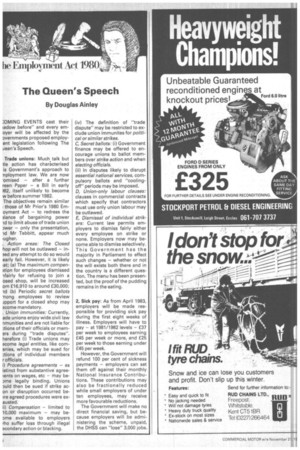The Queen's Speech
Page 46

If you've noticed an error in this article please click here to report it so we can fix it.
By Douglas Ainley
;OMING EVENTS cast their iadow before" and every emoyer will be affected by the Dvernments proposed employent legislation following The Jeenrs Speech.
Trade unions: Much, talk but tie action has characterised is Government's approach to nployment law. We are now :omised after a further reen Paper a Bill in early 182, itself unlikely to become w before summer 1982.
The objectives remain similar those of Mr Prior's 1980 Emoyment Act to redress the lance of bargaining power id to limit abuse of trade union )wer only the presentation, id Mr Tebbitt, appear much ■ ugher.
, Action areas: The Closed hop will not be outlawed inaed any attempt to do so would early fail. However, it is likely [at; (a) The maximum compen&on for employees dismissed ifairly for refusing to join a osed shop, will be increased om £16,910 to around £30,000; id (b) Periodic secret ballots -nong employees to review Jpport for a closed shop may acome mandatory.
, Union immunities: Currently, ade unions enjoy wide civil law rimunities and are not liable for 7.tions of their officials or memars during "trade disputes". herefore (i) Trade unions may acome legal entities, like comanies, which may be sued for tions of individual members r officials.
i) Procedure agreements as istinct from substantive agreelents on wages, etc may beme legally binding. Unions Duld then be sued if strike acon or disruption occurred beire agreed procedures were exausted.
ii) Compensation limited to 10,000 maximum may beme available to employers 'ho suffer loss through illegal acondary action or blacking.
(iv) The definition of "trade dispute" may be restricted to exclude union immunites for political or similar strikes.
C, Secret ballots: (i) Government finance may be offered to encourage unions to ballot members over strike action and when electing officials.
(ii) In disputes likely to disrupt essential national services, compulsory ballots and "coolingoff" periods may be imposed.
0, Union-only labour clauses: clauses in commercial contracts which specify that contractors must use only union labour may be outlawed.
E, Dismissal of individual strikers: Current law permits employers to dismiss fairly either every employee on strike or none. Employers now may become able to dismiss selectively. This Government has the majority in Parliament to effect such changes whether or not the will exists both there and in the country is a different question, The menu has been presented, but the proof of the pudding remains in the eating.
2. Sick pay: As from April 1983, employers will be maderesponsible for providing sick pay during the first eight weeks of illness. Employers will have to pay at 1981/1982 levels £37 per week to employees earning £45 per week or more, and £25 per week to those earning under £45 per week.
However, the Government will refund 100 per cent of sickness payments employers can set them off against their monthly National Insurance Contributions. These contributions may also be fractionally reduced while small employers of under ten employees, may receive more favourable reductions.
The Government will make no direct financial saving, but because employers will be administering the scheme, unpaid, the DHSS can "lose" 3,000 jobs.


















































